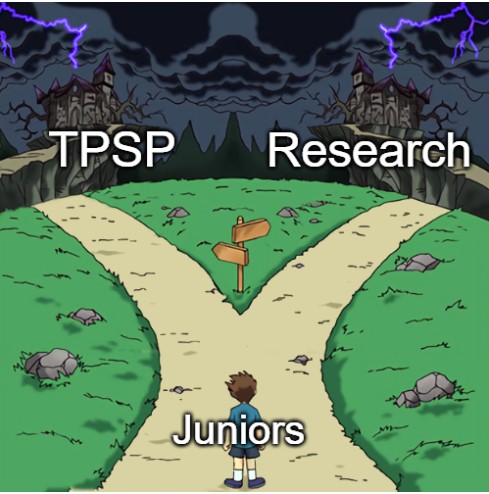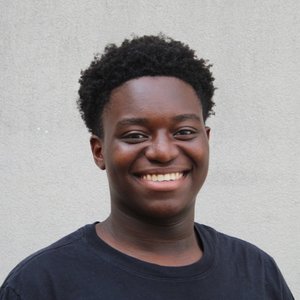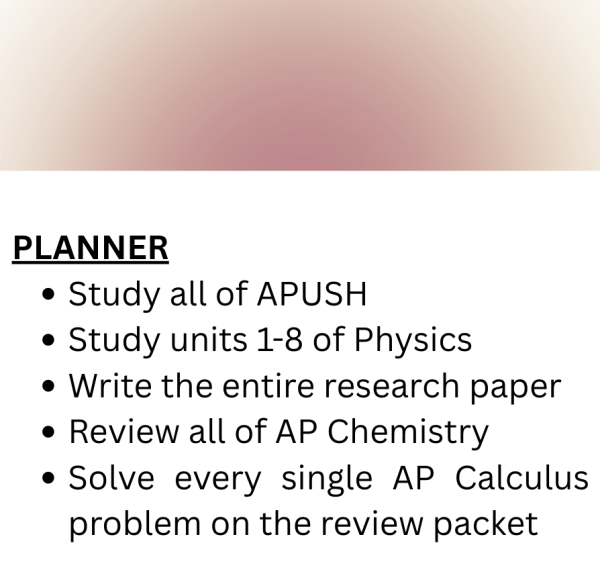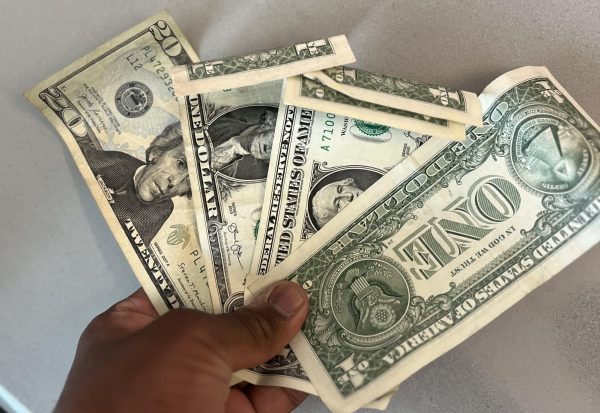Op-Ed: The CVHS Junior’s Burden: Why TPSP and Research shouldn’t be required

As CVHS students enter junior year, they have no choice but to be stuck between a rock and a hard place. (Joseph Mutagaya/Canva)
Sometime in the blur that was the online year, we had a conference with the administrators (one I certainly didn’t pay attention to) about course selection. At another time during that blur, I made a crucial mistake. Freshman Joseph, probably whipped into a fervor at the prospect of a mythology class, completely ignored the box that read “AP Seminar,” most likely under the guise of “AP = hard, hard = bad.” And now, here I am, two years later, with two less AP classes with TPSP, fifth period, in their place.
While I am now aware that the taking of a research class is a time-honored part of CVHS’s curriculum, I believe it is time that we accept that they should not be mandatory.
When I started this story, I took a poll of CVHS juniors to find the general consensus about these courses. At face value, these classes teach students how to develop, write and present research topics, a skill essential to many college majors. But the results of this poll showed that in reality, most see these classes as sources of unnecessary busy work and stress with no short-term benefits.
With comments like “waste of time” and words like “burnout” and “stress,” it’s safe to say most of these students would agree with the whole “making research classes voluntary” part of my article.
But to understand the problem with these classes, we must first understand what exactly these classes entail.
According to College Board, AP Research is dedicated to teaching students skills like “learning research methodology, employing ethical research practices, and accessing, analyzing and synthesizing information.” They must establish a position on their chosen topic and provide evidence for their claims backed by research. The goal is that, with these skills, students can have a college-grade research paper based on a topic of their choice by the end of a school year.
In this respect, TPSP and AP Research have nearly identical goals. But while AP Research focuses on the broader “investigation” of a variety of theories and ideas, TPSP is focused squarely on problem solving. Essentially, AP Research students advocate and TPSP students solve.
To meet this aim, students follow a much more structured path. They must find a problem, create claims to justify the investigation of said problem and finally, construct a corresponding product and research paper detailed in TEKS which you can view on the TPSP website.
With this context, we can now see why some students may feel contempt for our school’s approach to these classes.
No matter their differences, both classes were made, by design, for students to explore their topic. Even in the more rigid TPSP, students are expected to work independently to justify their topic and develop a unique product using their own resources, designs, etc. When it comes to writing in the academic style or collecting data, of course students benefit from handholding. However, instruction becomes reductive when completing worksheets becomes paramount to creativity, innovation and integrity.
This pattern of genuine effort turning to begrudging participation is reflective in the downward trend in volunteering, specifically in teens and young adults.
According to EdWeek, the University of Maryland’s DoGood Institute found that volunteerism among teens decreased from 28% in 2005 to 25%, using data from the Census. The article attributes the decrease to legislation or the lack thereof, stating “just 11 [states] require students to be involved in service learning projects.” However, on a national level, socioeconomic status and access to quality volunteer activities and organizations also play a big part with both “rural” and suburban volunteering dropping from about 30% in 2003 to about 25% by 2015.

According to the U.S. Census Bureau, volunteering accounts for almost 4.1 billion hours and $122 billion in labor. For many non-profit organizations that provide food, shelter, housing, advocacy and so many other essential services, the downward trend could cause significant damage to our local communities.
With all this at stake, why on Earth aren’t people getting up and heading to their local soup drive? All told, the main reason for the decrease, while influenced by multiple factors, is a decrease in or lack of interest. People aren’t volunteering because they’re bad people; they aren’t volunteering because it’s been reduced to an hour or two in the local food bank. In other words, instead of an investment into our communities, it’s become a photo opportunity, and requiring it doesn’t change that.
For this same reason, TPSP and AP Research, classes that otherwise encourage creativity and independence overall, have gained a reputation as time-consuming and unessential.
Unsurprisingly, there are students who enjoyed the class, like CVHS senior Abigail Savitz. Savitz believes the class helped her develop “incredibly important” skills, such as the academic writing style, and helped her scope out which colleges to attend and majors she wanted to pursue.
However, most students do not have the interest in research that propelled Savitz’s project forward. As a result, these classes have become more like detention halls, full of burnt out students doing work they have no interest in, instead doing homework for other classes, burning time and, most importantly, reducing the reputation of an otherwise invaluable course to a chorus of reluctant groans straight out of “The Walking Dead.” And this is why AP Research and TPSP should not be mandatory classes.
The Nobel Prize winning physicist Albert Einstein once said, “If you judge a fish by its ability to climb a tree, it will go its whole life thinking it is stupid.” Almost nowhere is this more true than high school.
CVHS is chock full of bright and ambitious students, most of whom are in constant pursuit of knowledge and self-improvement. We are not afraid of challenges and are characterized by our resilience and resourcefulness. We take challenging classes like AP Calculus BC and partake in a number of extracurriculars, penning songs, performing plays and programming robots that may or may not take over the world someday. But not every student is suited to every class. A student who finds AP Calculus as invigorating as cruising in a Ferrari may struggle in AP Art History. While we need guidance, we are not blind to those classes that best suit us and those that do not.
You can now listen to this story at:
Your donation will support the student journalists of Carnegie Vanguard High School. Your contribution will allow us to cover our annual website hosting costs and fund field trips, competition fees, and equipment. We appreciate your support!

Joseph Mutagaya is a currently a senior at Carnegie Vanguard High School. He loves acting for Carnegie Theatre, listening to music like SZA, Brent Faiyaz,...





